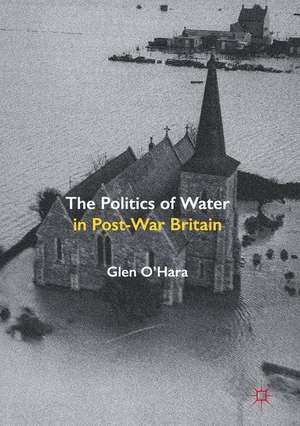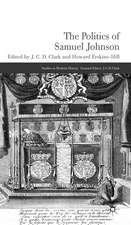The Politics of Water in Post-War Britain
Autor Glen O'Haraen Limba Engleză Hardback – 18 mai 2017
Preț: 871.36 lei
Preț vechi: 1025.14 lei
-15% Nou
Puncte Express: 1307
Preț estimativ în valută:
166.74€ • 178.30$ • 139.02£
166.74€ • 178.30$ • 139.02£
Carte tipărită la comandă
Livrare economică 17 aprilie-01 mai
Preluare comenzi: 021 569.72.76
Specificații
ISBN-13: 9781137446398
ISBN-10: 1137446390
Pagini: 290
Ilustrații: XIII, 313 p. 2 illus.
Dimensiuni: 148 x 210 x 24 mm
Greutate: 5.26 kg
Ediția:1st ed. 2017
Editura: Palgrave Macmillan UK
Colecția Palgrave Macmillan
Locul publicării:London, United Kingdom
ISBN-10: 1137446390
Pagini: 290
Ilustrații: XIII, 313 p. 2 illus.
Dimensiuni: 148 x 210 x 24 mm
Greutate: 5.26 kg
Ediția:1st ed. 2017
Editura: Palgrave Macmillan UK
Colecția Palgrave Macmillan
Locul publicării:London, United Kingdom
Cuprins
1. Introduction: water as history.- 2. Reconceptualising water politics in post-war Britain.- 3. The great flood of 1953.- 4. River pollution.- 5. Maritime and oceanic pollution.- 6. Water safety.- 7. Hot and cold water in the home.- 8. The fluoridation debate.- 9. Conclusions: water and society in post-war Britain.- Bibliography.
Recenzii
“This offers a distinctive approach to history of the well-known struggle by women for improvements in housing amenities, alongside the ambiguous effects of improvements in such amenities for women’s role in the division of domestic labour. … the aims of this book are achieved in style. The importance of water-related issues in shaping post-war British politics is amply demonstrated, as is the possibility of using those issues to bring new understandings of Britain’s post-war history.” (Jim Tomlinson, Journal of Contemporary History, Vol. 56 (3), 2021)
“The politics of water in post-war Britain has much to offer the fields of environmental history and political history. It represents the drawing together of a number of interdisciplinary threads to address the topic of water, and the politics it engenders,as a whole, which I am certain will prove useful and informative for the future study of water politics and environmental history as a whole.” (Jane E. Rowling, Agricultural History Review, Vol. 68 (1), 2020)
“This text will appeal most to graduate students and specialists in the field, and it points to many topics deserving of further study. It is an excellent reference text and is essential reading for anyone interested in The Politics of Water in Post-War Britain.” (Matthew Osborn, Environmental History, Vol. 25 (1), 2020)
“The politics of water in post-war Britain has much to offer the fields of environmental history and political history. It represents the drawing together of a number of interdisciplinary threads to address the topic of water, and the politics it engenders,as a whole, which I am certain will prove useful and informative for the future study of water politics and environmental history as a whole.” (Jane E. Rowling, Agricultural History Review, Vol. 68 (1), 2020)
“This text will appeal most to graduate students and specialists in the field, and it points to many topics deserving of further study. It is an excellent reference text and is essential reading for anyone interested in The Politics of Water in Post-War Britain.” (Matthew Osborn, Environmental History, Vol. 25 (1), 2020)
Notă biografică
Glen O’Hara is Professor of Modern and Contemporary History at Oxford Brookes University, UK. He is the author of a number of books on modern Britain, including Britain and the Sea since 1600 (2010) and Governing Post-War Britain: The Paradoxes of Progress, 1951-1973 (2012).
Textul de pe ultima copertă
This is the first book to cover the British people’s late twentieth century engagement with water in all its domestic, national and international forms, and from bathing and household chores to controversies about maritime pollution. The British Isles, a relatively wet and rainy archipelago, cannot in any way be said to be short of liquid resources. Even so, it was the site of highly contentious and revealing political controversies over the meaning and use of water after the Second World War. A series of such issues divided political parties, pressure groups, government and voters, and form the subject matter of this book: problems as diverse as flood defence to river and beach cleanliness, from the teaching of swimming to the installation of hot and cold running water in the home, from international controls over maritime pollution, and from the different housework duties of men and women to the British state’s proposals to fluoridise the drinking water supply.
Caracteristici
Explores the highly contentious and revealing political controversies over the meaning and use of water in Britain. Employs an interdisciplinary approach to reveal a number of themes not immediately apparent to scholars working within older or more hermetically sealed parts of the discipline. Highlights pressing themes of contemporary relevance such as Flood defence or retreat and the modernisation of the water supply industry.

















